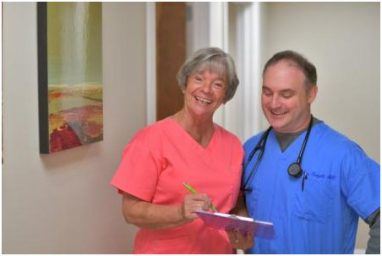It was at the repeated urging of her primary care doctor that Loretta Nunez of Manalapan finally arranged to have a lung cancer screening. As a smoker over the age of 55, Loretta was at risk for lung cancer. She underwent a low dose screening CT scan that detected a small, suspicious nodule on her lung. Her doctor, Marc Feingold, MD, who also happens to be her employer, referred her to Jean-Philippe Bocage, MD, a board-certified thoracic surgeon at Thoracic Group in Freehold and co-medical advisor of the Comprehensive Lung Care Program at CentraState, with the help and coordination of Sharon Lorfing, APN, nurse navigator for lung cancer at CentraState.
Loretta’s case was discussed at the multidisciplinary lung tumor board, a team of lung cancer experts who collaborate on patient care at CentraState. Dr. Bocage recommended that Loretta have surgery to remove the suspicious nodule.
She was diagnosed with a Stage I tumor and the surgery was scheduled for a short time later. Dr. Bocage and his partner, fellow co-medical advisor of the Comprehensive Lung Care Program at CentraState, Robert Caccavale, MD, performed a left upper lobectomy using video-assisted thoracic surgery, or VATS. With this minimally invasive technique, the patient is operated on through four 1-inch incisions. Almost all patients can go home after one to two days in the hospital and can return to normal preoperative activity within two to three weeks. The Thoracic Group has been leading the development and promotion of this technology since the early 1990s.
 In Loretta’s case, she only spent 24 hours in the hospital. Her recovery at home went as smoothly as the surgery. Before the first week was over, she was up doing laundry. By the second week, she went out for neighborhood walks and mall shopping trips. By week three, she returned to her job at Dr. Feingold’s office.
In Loretta’s case, she only spent 24 hours in the hospital. Her recovery at home went as smoothly as the surgery. Before the first week was over, she was up doing laundry. By the second week, she went out for neighborhood walks and mall shopping trips. By week three, she returned to her job at Dr. Feingold’s office.
One year later, Loretta’s follow-up CT scans show no sign of the cancer and her daily lung function was never affected. She did not need to undergo any further surgery or treatment with chemotherapy or radiation at all.
Lung cancer is still the leading killer among both men and women in the United States. Screening in at-risk patients long before any symptoms appear greatly increases the chances of finding cancer early, when it’s most treatable. Early detection has been shown to improve survival rates. Approximately 80 percent of patients who are diagnosed with Stage I lung cancer are still alive at five years after surgery treatment.
“If it weren’t for Dr. Feingold insisting on this screening, the cancer would have kept growing,” Loretta says. “I feel genuinely grateful to everyone who was involved and that the experience was not frightening because it went exactly the way Dr. Bocage explained it would.”
For more information about CentraState’s Comprehensive Lung Cancer Program, call 866-CENTRA7
(866-236-8727).





